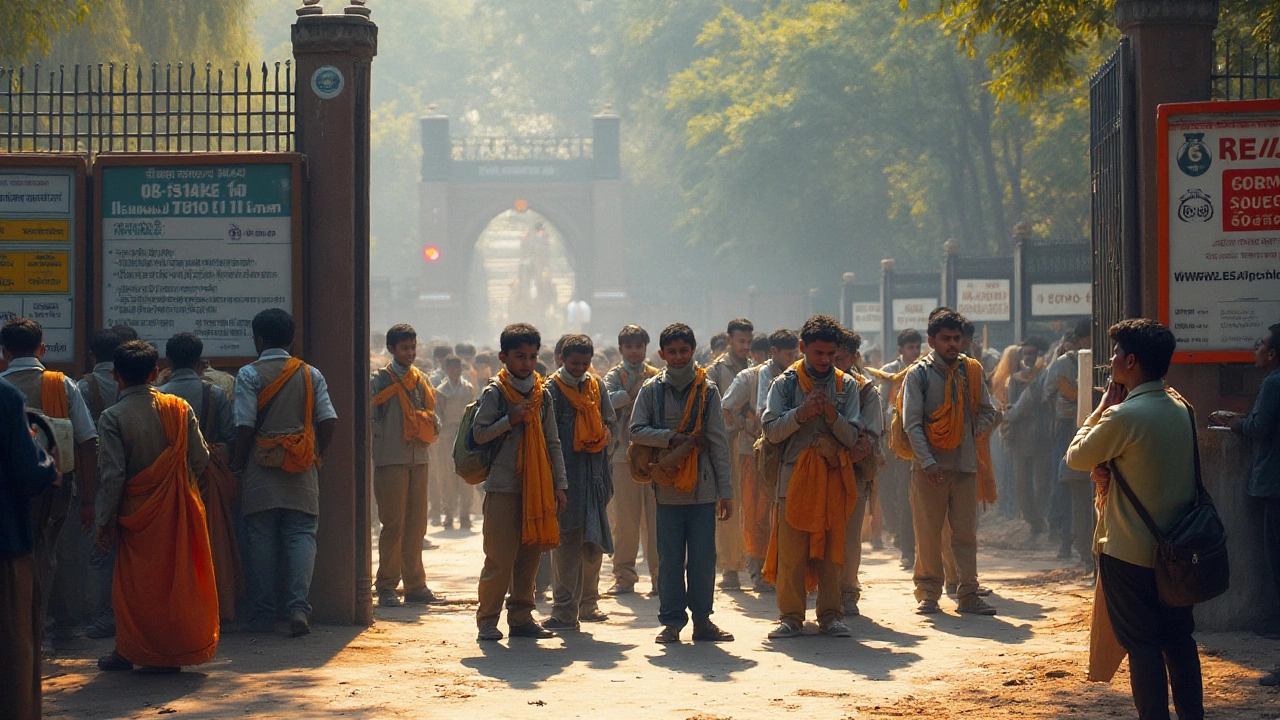
When it comes to competitive exams, many hold the key to unlocking prestigious academic and career opportunities. These tests, known for their rigor and discerning nature, often stir a whirlwind of anxiety and anticipation among students across the globe. Yet, amidst the frantic preparation and sleepless nights lie unparalleled opportunities for those who succeed.
Not every exam labeled as competitive carries the same weight or operates under identical principles. From China's notorious Gaokao to India's fiercely fought IIT-JEE, and the famed SAT in the United States, each exam serves distinct purposes and carries unique challenges. Delving deeper into what makes these exams stand out provides insights not just for aspirants, but for educators and policymakers seeking to understand the global competitive landscape.
- Understanding Competitive Exams
- Top Competitive Exams Worldwide
- Factors That Make an Exam Competitive
- Preparation Tips for Tough Exams
- Impact of Competitive Exams on Careers
Understanding Competitive Exams
Competitive exams have become a defining feature in the educational systems around the globe, often acting as gateways to higher learning institutes, professional courses, and coveted government jobs. They are meticulously designed tests that assess a candidate's aptitude, knowledge, time management, and analytical skills. One of the distinguishing features of these exams is their ability to filter out only the most prepared individuals from a pool of numerous aspirants. In essence, these exams serve as a bridge between an individual's current capabilities and their future ambitions, where achieving a high score plays a crucial role.
The nature and complexity of these exams can vary significantly from one country to another, reflecting their diverse educational landscapes and priorities. For instance, China's Gaokao is famously challenging, a two-day marathon considered a decisive moment for Chinese students. With a potential score that can dictate one's future, it epitomizes the pressures of competitive exams. In contrast, the SAT in the United States evaluates prospective college students, focusing on verbal, mathematical, and written skills to assess readiness for university education. Similarly, the Indian Institutes of Technology Joint Entrance Examination (IIT-JEE) is renowned for its difficulty and is viewed by many as a golden ticket to engineering excellence in India.
"Education is the most powerful weapon which you can use to change the world," said Nelson Mandela. This notion underlies the importance of these exams, highlighting their role in providing opportunities based on merit.
While the primary aim of these tests is to evaluate academic prowess or potential, various factors contribute to their competitiveness. The sheer number of aspirants vying for limited seats significantly heightens the challenge. The technicalities of questions often require not just rote learning but a thorough understanding of concepts, encouraging critical thinking and innovation among candidates. In line with technological advancements, many of these exams now incorporate digital platforms for testing and assessment, which adds another layer of complexity.
Understanding these exams involves not just recognizing their structure but also acknowledging the rigorous preparation they demand. Many candidates dedicate months, if not years, toward preparing for these tests, investing in prep courses, study materials, and mock exams. The mental resilience built during this phase is as important as the knowledge gained. As educational theorists explore the impacts of these exams, debates continue around the benefits and stresses imposed by such high-stakes testing.
Top Competitive Exams Worldwide
The landscape of competitive exams is vast and varied, spanning across different continents and cultures, each reflecting unique educational goals and societal demands. Among these, the Chinese Gaokao is often hailed as one of the most formidable, rigorously testing millions of students annually in a marathon of academic endurance. Comparable to a rite of passage, the Gaokao not only influences university admissions but also shapes the futures of its participants in profound ways. This exam, with its meticulous testing of various subjects, epitomizes the intense academic atmosphere pervading China, demanding a year or more of dedicated preparation from its aspirants.
In India, the JEE (Joint Entrance Examination), a gateway to premier engineering institutes such as the IITs (Indian Institutes of Technology), is another such behemoth. The JEE has two levels, the Main and Advanced, each distinct in its challenge, yet integral in opening doors to prestigious technical careers. With acceptance rates often under ten percent, the JEE not only tests students' grasp of concepts but also their analytical and problem-solving prowess, making it one of the toughest battles in the realm of education. An interesting fact, even those ranked top in this exam find it hard to secure places due to the sheer volume of aspirants versus limited seats available.
The United States fields its own suite of challenging tests, with the SAT and ACT forming the crux of college admissions. Though perceived as more lenient compared to some international counterparts, these exams demand comprehensive subject knowledge and strategic acumen. Students from various backgrounds vie for top scores, knowing that their results significantly influence their higher education trajectory. Harvard admissions officer, in a candid interview, once remarked,
"The SAT is not just a test of knowledge; it's a test of perseverance and a student's ability to think under pressure."This further underscores the competitive environment surrounding these exams.
Across the shores in Germany, the Abitur presents a distinct, yet equally demanding academic exercise. Known for its breadth, the Abitur evaluates students over a range of core subjects, culminating in an exit examination that plays a decisive role in University admissions. Unlike some of the previously mentioned assessments, the Abitur reflects a more holistic academic evaluation process, encompassing years of schooling into its final scores. This comprehensive approach highlights the different educational philosophies across the globe and their influence on shaping future scholars.
Meanwhile, Japan's University Entrance Exams stand as a pivotal moment for young scholars, determining their educational and often professional paths. These exams reflect Japan's commitment to rigorous academics, with the juken season marking an intense period of study. The stress surrounding these exams is so ingrained that society has coined terms like "examination hell" to describe the pressure-filled experience. As we explore these exams, what emerges is a rich tapestry of educational aspirations worldwide, each striving to foster talented individuals ready to tackle the demands of an ever-evolving world.

Factors That Make an Exam Competitive
Understanding what renders an exam truly competitive requires a multi-faceted exploration of various intrinsic and extrinsic elements. The degree of competition is often dictated by the number of applicants vying for a limited number of seats or roles. An examination becomes highly competitive when the ratio of candidates to available positions is overwhelmingly skewed, which is a common scenario with entrance exams to prestigious institutions. This intense rivalry necessitates candidates to achieve near-perfect scores, thus raising the stakes substantially.
Another significant factor is the extensive scope of the syllabus covered by these exams. Competitive exams like the Gaokao or IIT-JEE are notorious for their extensive content, spanning numerous subjects and integrating complex problems that test both knowledge and analytical skills. The sheer breadth and depth of what is required in preparation render these competitive exams particularly challenging, demanding relentless dedication and time commitment from aspirants.
Time limitations during the exam also play a crucial role in intensifying competition. Exam designs often necessitate quick thinking and rapid decision-making under pressure, testing not only a candidate’s intellectual grasp but also their ability to manage stress. The speed and accuracy with which one can navigate these examinations can often be a decisive factor in performance. This aspect of exam structure is meticulously crafted to not only assess a candidate’s preparation but also their intrinsic ability to handle high-pressure environments.
Moreover, the complexity of questions, often designed to test beyond rote memorization, distinguishes these assessments as competitive. Exams such as the SAT incorporate critical thinking and problem-solving components that assess a candidate’s ability to apply learned concepts in unfamiliar ways. This elevates the difficulty level, ensuring that only those with a profound understanding and practical application skills excel. In terms of design, these tests are structured to push the intellectual boundaries of candidates, promoting creativity alongside technical proficiency.
"The exam’s purpose is not just evaluation but to filter individuals capable of thriving in dynamic and demanding settings," notes education strategist Mary Lam. Such examinations blend cognitive challenges with assessments of practical aptitude, highlighting the need for dynamic thinking.
The societal and academic value perceived in acing such exams also amplifies the competition. Success in these exams is often correlated with substantial social prestige and career advantages, influencing a candidate’s future prospects and their family’s socio-economic status. Thus, these cultural and economic factors fuel the drive and pressure surrounding the most sought-after global exams.
Preparation Tips for Tough Exams
Preparing for competitive exams can seem like an uphill battle, but breaking down the process can simplify your journey. One of the most important strategies is to understand the exam's structure and syllabus thoroughly. Whether you are facing the daunting Gaokao or taking on the challenges of the SAT, knowing what to expect is crucial. Make it a priority to gather reliable resources like previous years' question papers, detailed syllabi, and high-quality preparatory books. The internet also hosts a wealth of information; use it wisely to access free mock tests and academic forums where tips and strategies are often shared by successful candidates and experts alike.
Time management is another critical factor in succeeding in tough exams. Crafting a study schedule that allows consistent and focused preparation over a period of time is essential. Ensure to cover and revise all important topics and allocate time for practice tests. Regular self-assessment helps you gauge your preparedness and adjust your approach accordingly. Break down your study sessions into manageable chunks of time with short breaks to maintain concentration. The Pomodoro Technique, which includes 25 to 30 minutes of focused work followed by a short break, is often recommended to boost productivity and prevent burnout during long study hours.
Balancing stress and maintaining a positive mindset plays a pivotal role when preparing for tough competitive exams. Incorporating mindfulness techniques such as meditation, yoga, or simple breathing exercises can help manage anxiety and keep you centered. A healthy lifestyle, inclusive of regular exercise and balanced nutrition, will keep both your body and mind in peak condition. Avoid succumbing to the temptation of pulling all-nighters; instead, ensure adequate sleep to enhance retention and cognitive function. Establishing a support system by connecting with family, friends, or fellow candidates can offer motivation and share the preparation pressure. As motivational speaker Zig Ziglar once said,
"Success occurs when opportunity meets preparation."Let these words remind you of the power of being prepared.
Essential resources and tools can significantly aid preparation efforts. Investing in good guides and leveraging online courses tailored specifically for your target exam can make a big difference. If you are preparing for multiple exams, prioritize them according to their dates and importance, possibly creating a flexible but detailed planner or calendar. Creating concise notes, either manually or digitally, will aid in quick revisions close to the exam date. There are several educational apps available that offer interactive learning experiences, making it easier to comprehend challenging concepts. And don't underestimate the power of study groups; collaborating with peers will allow you to gain different perspectives and reinforce your understanding by teaching others.

Impact of Competitive Exams on Careers
Competitive exams often serve as pivotal milestones in a career's progression. Their impact stretches beyond mere academic canvases, reaching deeply into professional realms. Attaining high ranks in these competitive exams can open doors to top educational institutions, laying a strong foundation for future career opportunities. For instance, achieving success in India's IIT-JEE not only leads to enrollment in prestigious IITs but also positions candidates as top-tier graduates sought by global companies. This immediate propulsion into a promising career trajectory is one reason why students invest immense time and effort into mastering these examinations.
Beyond immediate job opportunities, competitive exams cultivate numerous skills that are invaluable in professional settings. The preparation process itself hones critical thinking and problem-solving abilities, and refines time management skills. Successful candidates often find they have learned self-discipline and perseverance, qualities that enhance their workplace effectiveness and innovation. These attributes not only enhance their desirability as job candidates but also prepare them for leadership roles as their careers progress.
Competitive exams often dictate one's career path due to the exclusive specialization they enable. For example, passing the American Bar Association exam is mandatory for aspiring lawyers in the United States, directly determining their eligibility to practice law. Similarly, the Medical College Admission Test (MCAT) is a gatekeeper for students aiming to enter medical schools, shaping not only their educational journey but their professional future.
While these exams serve as career gateways, they also pose stress and mental health challenges. The competitive nature creates a high-pressure environment that can lead to anxiety and burnout, sometimes hindering mental well-being. It's crucial for aspirants to maintain a balanced perspective and develop strategies to manage stress. It's often emphasized that while achievement in competitive exams is important, it is not the sole determinant of one's capabilities or future success. As Bill Gates, co-founder of Microsoft, once noted, "It's fine to celebrate success but it is more important to heed the lessons of failure." Understanding this balance is paramount for long-term satisfaction and achievement.
The impact of competitive exams extends globally, influencing not only individual careers but also industry standards. Countries with rigorous exam systems, like China with Gaokao, often see students entering fields that are in high demand, thus affecting economic and educational trends. Institutions and organizations worldwide recognize exam achievements, often as benchmarks for academic quality and preparedness levels.







